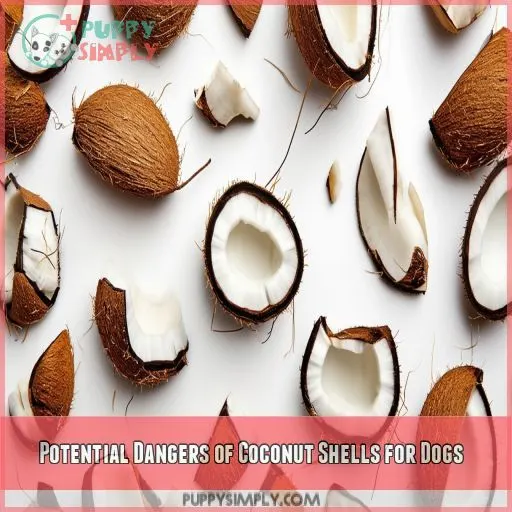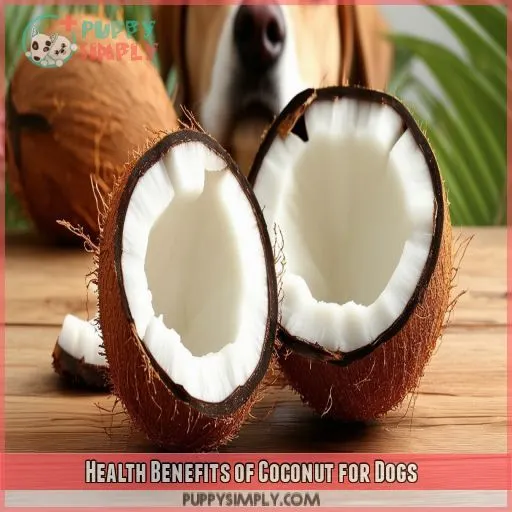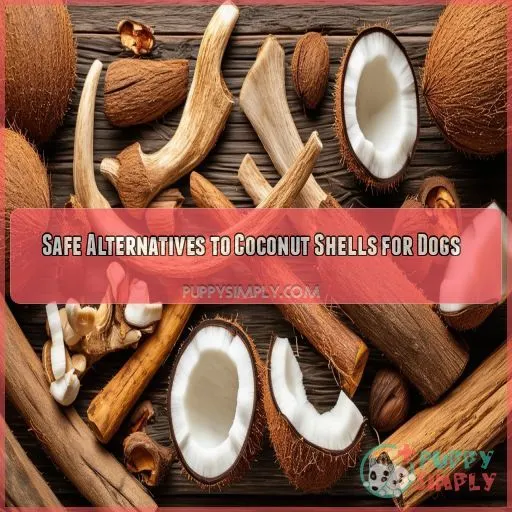This site is supported by our readers. We may earn a commission, at no cost to you, if you purchase through links.
 Want to know if it’s safe for your dog to snack on coconut shells? You should be aware of the danger involved before you let your furry friend dig in with this tropical treat.
Want to know if it’s safe for your dog to snack on coconut shells? You should be aware of the danger involved before you let your furry friend dig in with this tropical treat.
While coconuts do have a few health benefits for dogs, their shells can be truly dangerous. In this article, find out why coconut shells are taboo, which parts of the coconut are safe for your dog to eat, and what the experts advise if your dog accidentally eats one.
We’ll also consider some safe alternatives that can help satisfy your dog’s urge to chew
Table Of Contents
- Key Takeaways
- Can Dogs Eat Coconut Shells?
- Are Coconut Shells Safe for Dogs?
- Potential Dangers of Coconut Shells for Dogs
- What Parts of a Coconut Can Dogs Safely Eat?
- Health Benefits of Coconut for Dogs
- Signs of Coconut Shell Ingestion in Dogs
- What to Do if Your Dog Eats Coconut Shell
- Safe Alternatives to Coconut Shells for Dogs
- Frequently Asked Questions (FAQs)
- Are coconut shells poisonous to dogs?
- What part of a coconut can a dog eat?
- Can dogs eat coconut peel?
- Is it OK for dogs to chew on coconut husk?
- Can dogs eat coconut flesh?
- Can dogs eat coconut shells?
- Why do dogs eat coconut?
- Can dogs eat coconut husk?
- Can dogs digest small pieces of coconut shell?
- How long does it take to pass coconut shell?
- Are some dog breeds more tolerant of coconut shells?
- Can coconut shell fragments cause internal bleeding in dogs?
- Does coconut shell fiber have any nutritional benefits?
- Conclusion
Key Takeaways
- Coconut shells are a no-go for Fido! They’re about as digestible as a rock and can cause some serious tummy troubles. Stick to safer chew toys that won’t send you on an emergency vet visit.
- While coconut shells are off the menu, your pup can still get their tropical fix. Coconut meat, water, and oil can be doggone delicious treats when given in moderation. Just remember, too much of a good thing can lead to a pudgy pooch!
- If your four-legged friend decides to play Houdini and snags a coconut shell, don’t panic! Keep a watchful eye for any signs of distress and ring up your vet faster than you can say "coconuts." Better safe than sorry when it comes to your furry companion.
- Looking for a coconut fix without the shell shock? Try whipping up some homemade coconut treats or freezing coconut water cubes for a tail-wagging good time. Your pup will think they’ve hit the jackpot without the risk of becoming a canine contortionist trying to pass shell fragments
Can Dogs Eat Coconut Shells?
No, dogs should not eat coconut shells. While coconut meat and water can offer health benefits, the hard shell poses serious risks.
Coconut shells can cause choking, digestive blockages, and dental injuries. If your pup ingests a coconut shell, watch for signs like vomiting, lethargy, or abdominal pain. Call your vet immediately if you suspect your dog has eaten coconut shell pieces.
Instead, offer safe alternatives like dog-friendly coconut treats or small amounts of fresh coconut meat. Always remove coconut shells from your dog’s reach to prevent accidents.
There’s more to know about coconut safety for your furry friend, so let’s explore the details
Are Coconut Shells Safe for Dogs?
You may be wondering if it’s okay to let your fur baby crunch on coconut shells. The short answer? It’s a big no-no.
While dogs can enjoy parts of a coconut, this is not the case with the shell. Those rough, fibrous shells are definitely not meant to pass through doggy digestion and could bring severe problems to your pet’s health.
Shells, in comparison with coconut meat or water, which come with their advantages, pose significant dangers. They’re not only indigestible; they can be truly dangerous as well. Think of it like giving your dog a splintery wooden toy – it’s a recipe for disaster.
Potential Dangers of Coconut Shells for Dogs
Coconut shells pose significant risks to your dog’s health and safety. They can cause choking, create digestive blockages, and potentially lead to dental injuries if your dog tries to chew on them
Choking Hazards
Coconut shells pose serious choking hazards for your furry friend. The hard, jagged pieces can get lodged in their throat, causing panic and potential suffocation. Don’t risk it – keep those shells out of reach. Stick to safe dog treats instead, like coconut flakes, to satisfy their cravings without the danger
Digestive Blockages
Apart from that, coconut shells can cause severe obstruction in digestion. Its rigid and fibrous nature causes intestinal obstruction. To save your dog’s digestive system from severe danger:
-
Monitoring the consistency of stool
· Increase fiber intake
-
Ensure proper hydration
• Removal of coconut husks and shells
- Offer only small amounts of coconut meat
Stay vigilant for signs of discomfort
Dental Injuries
Coconut shells can wreak havoc on your dog’s teeth. The hard surface and sharp edges might cause tooth fractures or gum lacerations. These injuries can lead to painful dental infections, potentially requiring root canals. It’s best to keep coconut shells away from your furry friend to protect their pearly whites
What Parts of a Coconut Can Dogs Safely Eat?
While coconut shells are off-limits, dogs can safely consume other parts of the coconut. You can offer your furry friend coconut meat, coconut water, and coconut oil in moderation, as these components provide various health benefits without the risks associated with the shell
Coconut Meat
You can safely feed your dog coconut meat in moderation. It’s full of nutrients that enhance your pup’s immune system and other aspects of general health. Be careful with sugar intake and allergies, however. Always introduce new foods gradually to see whether your dog likes them or will stomach them.
A golden retriever sniffing a freshly cracked coconut.
One small bowl filled with small chunks of coconut meat
- A curious pug tilts his head at the sight of coconut flakes.
- Contented Labrador licking lips after tasting coconut
Coconut Water
You can safely give your dog coconut water in moderation. It’s packed with electrolytes and supports hydration. However, be cautious with store-bought varieties, as they may contain added sugars or preservatives. Here’s a quick guide:
| Benefit | Caution |
|---|---|
| Hydration | Potential diarrhea |
| Electrolyte balance | Watch for added sugars |
| Skin health | Avoid flavored varieties |
| Healing properties | Moderation is key |
| Natural energy | Not a substitute for water |
Coconut Oil
Coconut oil can be a healthy addition to your dog’s diet. It’s packed with medium-chain fatty acids and lauric acid, offering potential benefits for:
- Skin and coat health
- Digestive system
- Immune function
Start with small amounts to avoid upset tummies. Always consult your vet before introducing new foods to your pup’s diet
Health Benefits of Coconut for Dogs
While coconut shells are dangerous for dogs, the meat and oil of coconuts offer several health benefits. Coconut can boost your dog’s immune system, improve skin and coat health, and provide anti-inflammatory properties that may help with various conditions
Immune System Boost
Coconut can give your dog’s immune system a powerful boost. It’s packed with antioxidants that fight off harmful bacteria and viruses. Just be mindful of coconut allergies and adjust the dosage based on your pup’s age and size. Seniors might benefit more, while it could aid in weight loss for hefty hounds
Skin And Coat Health
You’ll love what coconut can do for your dog’s skin and coat health. It’s a natural wonder that can transform your pup’s appearance and comfort. Here’s how coconut benefits your furry friend:
- Moisturizes dry, itchy skin
- Improves coat shine and softness
- Reduces shedding, especially during shedding season
- Helps manage skin allergies and irritations
Anti-Inflammatory Properties
Coconut’s anti-inflammatory properties can benefit your dog’s overall health. It may help with pain relief, joint health, and wound healing. As a natural skin moisturizer, it can soothe irritated skin. However, be cautious of potential coconut allergies. Always consult your vet before incorporating coconut into your pup’s diet
Signs of Coconut Shell Ingestion in Dogs
While coconuts are good for health, the coconut shells are a different thing altogether and pose a threat to your fur baby. Watch out for the following danger signs in case you think your dog has ingested coconut shell:
• Vomiting or retching, especially if constant
• Lethargy or unusual behavior
• Abdominal pain or swelling
- Loss of appetite or refusing food
• Straining with bowel movements or constipation
These may be indicators of gastrointestinal obstruction or upset, which, in its worst scenario of long-term effects, could mean problems related to fiber intake or allergic reactions. If you observe these signs, don’t panic but act fast. Always remember that prevention is better than cure – so keep coconut shells out of reach from your dog.
Mix coconut water with regular water and give it to your dog to drink so he can get hydrated. The coconut water can supplement electrolytes and nutrients and support his digestive system. However, if the symptoms persist or worsen, you should immediately seek the advice of your veterinarian for professional guidance.
What to Do if Your Dog Eats Coconut Shell
If your dog has eaten coconut shell, don’t panic, but take action. First, call your vet for a consultation. They’ll assess the situation based on your dog’s size, health, and the amount ingested.
Keep a close eye on your furry friend, watching for signs of distress like vomiting, diarrhea, or lethargy. Hydration is key, so encourage your dog to drink water. You can even add a splash of low-sodium broth to entice them. Avoid giving sugary treats or coconut water with added sweeteners, as these may upset their stomach further.
While waiting for professional advice, remove any remaining coconut shells from your dog’s reach. Remember, prevention is better than cure, so it’s best to keep coconuts and their shells out of paw’s reach in the future.
Your quick thinking and careful monitoring can make all the difference in ensuring your pup’s safety and well-being
Safe Alternatives to Coconut Shells for Dogs
Instead of coconut shells, you can offer your dog safe coconut treats made specifically for canines. You can also provide appropriate chew toys designed to satisfy your dog’s natural urge to gnaw without the risks associated with coconut shells
Dog-friendly Coconut Treats
Want to treat your pup to coconut without the shell dangers? Try these dog-friendly coconut alternatives:
- Homemade coconut peanut butter biscuits
- Frozen coconut water cubes for hot days
- Shredded coconut sprinkled on meals
- Coconut oil drizzled over kibble
- Small pieces of fresh coconut meat as occasional treats
Always introduce new foods slowly to check for allergies. Remember, moderation is key with coconut treats. They’re high in calories and fats, so offer sparingly. Consult your vet if you’re unsure about incorporating coconut into your dog’s diet
Appropriate Chew Toys
While coconut snacks are yummy, truly safe chew toys are a must for your dog. Here’s a comparison of appropriate alternatives to coconut shells:
| Type of Toy | Benefits | Drawbacks |
|---|---|---|
| Rubber Kong | Durable, fillable | May become too firm for some of them |
| Nylabone | Long-lasting, dental health | Can splinter if aggressive chewer |
| Rope toys | Cleans teeth, interactive | Can be a choking hazard it if unravels |
| Antlers | Organic, long-lasting | Expensive, may crack teeth |
Select toys according to the size and chewing propensity of your dog for safe and enjoyable playtime without risks associated with coconut shells.
Frequently Asked Questions (FAQs)
Are coconut shells poisonous to dogs?
Coconut shells aren’t poisonous to dogs, but they’re dangerous if ingested. You shouldn’t let your furry friend chew on them. They can cause blockages or injuries in the digestive tract. It’s best to keep them out of reach
What part of a coconut can a dog eat?
You can safely feed your dog the coconut meat and water. Avoid the shell and husk, as they’re tough to digest and may cause blockages. Always remove the outer layers and offer small amounts of the inner flesh
Can dogs eat coconut peel?
Imagine a dog as a curious explorer in a coconut jungle. You shouldn’t let your furry friend eat coconut peel. It’s tough, fibrous, and hard to digest. Stick to the soft, white flesh for a safer treat
Is it OK for dogs to chew on coconut husk?
You shouldn’t let your dog chew on coconut husks. They’re too tough and fibrous, risking digestive issues or choking. Stick to safer chew toys designed for dogs. If they’ve ingested some, watch for signs of distress
Can dogs eat coconut flesh?
Yes, dogs can eat coconut flesh in moderation. It’s packed with nutrients and offers health benefits. You’ll want to remove the shell and introduce it slowly. Watch for any digestive upset, and always consult your vet first
Can dogs eat coconut shells?
You shouldn’t let your dog eat coconut shells. They’re hard to digest and can cause blockages or intestinal problems. Stick to feeding your pup coconut flesh in moderation. It’s safer and offers health benefits without the risks
Why do dogs eat coconut?
Dogs could be attracted to the coconut because of its sweet smell and taste. Curiosity and hunting—natural principles in dogs—can drive them to new foods, but it’s essential to feed them coconut safely: without shells and in limited quantities to avoid gastrointestinal issues.
Can dogs eat coconut husk?
You’d need a jaw of steel to chew coconut husk! Don’t let your dog try. It’s tough, fibrous, and can cause choking or intestinal blockages. Stick to safe, dog-friendly treats instead for your pup’s health and happiness
Can dogs digest small pieces of coconut shell?
Dogs can’t digest coconut shells effectively. Small pieces may pass through, but they pose risks of intestinal blockage or injury. It’s best to keep shells away from your pup. Stick to feeding them safe, shell-free coconut treats instead
How long does it take to pass coconut shell?
It’ll typically take 10-24 hours for small coconut shell pieces to pass through your dog’s system. Keep an eye on their behavior and stool. If you notice any distress or blockage signs, contact your vet immediately
Are some dog breeds more tolerant of coconut shells?
Like a roll of the dice, a dog’s tolerance for coconut shells isn’t breed-specific. You’ll find variation among individuals. It’s best to avoid giving any dog coconut shells, as they’re hard to digest and can cause blockages
Can coconut shell fragments cause internal bleeding in dogs?
Indeed, coconut shell fragments can result in internal bleeding in dogs. They’re sharp and undigested, and because of this, they can cut or puncture the digestive tract. You should keep your furry friend away from coconut shells to avoid severe health complications.
Does coconut shell fiber have any nutritional benefits?
While 85% of coconut shell is dietary fiber, it’s not beneficial for dogs. You shouldn’t feed your pup coconut shells. They’re indigestible and can cause dangerous blockages. Stick to small amounts of coconut meat for nutritional benefits instead
Conclusion
Like a siren’s call, coconut shells may tempt your dog, but they’re a hidden danger you shouldn’t ignore. Remember, can dogs eat coconut shells? The answer is a resounding no.
While coconuts offer some health perks, their shells pose serious risks. Stick to safe parts like coconut meat, water, or oil for treats.
If your dog accidentally ingests a shell, don’t hesitate to contact your vet.













